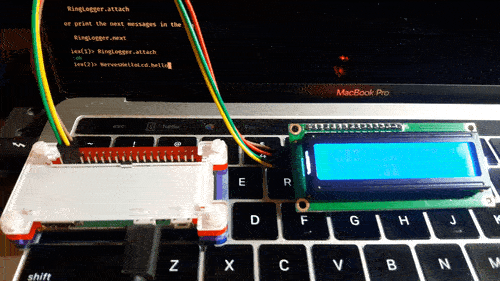# LcdDisplay
[](https://hex.pm/packages/lcd_display)
[](https://hexdocs.pm/lcd_display/LcdDisplay.html)

`LcdDisplay` allows you to control a [Hitachi HD44780](https://en.wikipedia.org/wiki/Hitachi_HD44780_LCD_controller)-compatible
[Liquid-crystal display (LCD)](https://en.wikipedia.org/wiki/Liquid-crystal_display) in [Elixir](https://elixir-lang.org/).
For the specification of the HD44780 LCD, please refer to the [HD44780 data sheet](https://cdn-shop.adafruit.com/datasheets/HD44780.pdf).

## Installation
You can install `LcdDisplay` by adding `lcd_display` to your list of dependencies in `mix.exs`:
```elixir
def deps do
[
{:lcd_display, "~> 0.2.0"}
]
end
```
## Usage
As an example, if you want to control a [Hitachi HD44780](https://en.wikipedia.org/wiki/Hitachi_HD44780_LCD_controller) type display through
the 8-bit I/O expander [PCF8574](https://www.nxp.com/docs/en/data-sheet/PCF8574_PCF8574A.pdf),
you can use `LcdDisplay.HD44780.PCF8574` module as a display driver.
### Start an LCD driver and get a PID
```elixir
driver_config = %{
driver_module: LcdDisplay.HD44780.PCF8574,
i2c_bus: "i2c-1", # I2C bus name
i2c_address: 0x27, # 7-bit address
rows: 2, # the number of display rows
cols: 16, # the number of display columns
font_size: "5x8" # "5x10" or "5x8"
}
{:ok, pid} = LcdDisplay.start_link(driver_config)
```
The resulting process will be supervised and locally registered under the composite key of the display module and the specified display name.
Many configuration values are optional, falling back to default values. Please refer to each display module documentation.
### Run commands
Please refer to the `LcdDisplay.HD44780.Driver` documentation for supported display commands.
```elixir
# Print text
LcdDisplay.execute(pid, {:print, "Hello world"})
# Print a character at a time
LcdDisplay.execute(pid, {:print, 0b00110001})
LcdDisplay.execute(pid, {:print, 0b00110000})
LcdDisplay.execute(pid, {:print, 0b00100101})
LcdDisplay.execute(pid, :clear)
```
### Driver modules
Different products out there use different I/O expanders, so please be aware of which I/O expander you are using if you use something like an I2C backpack.
Also the pin assignment between the LCD and the I/O expander is important since this library assumes certain pin assignment based on popular products out there.
#### for parallel I/O
When you connect an LCD standalone directly to the GPIO pins on your target device, the `LcdDisplay.HD44780.GPIO` driver module is useful.
Here are some relevant products:
- [Adafruit Assembled Standard LCD 16x2 - White on Blue](https://www.adafruit.com/product/1447)
- [Adafruit Standard LCD 16x2 - white on blue](https://www.adafruit.com/product/181)
- [Adafruit Standard LCD 20x4 - white on blue](https://www.adafruit.com/product/198)
- [Adafruit RGB backlight LCD 16x2 - black on RGB](https://www.adafruit.com/product/398)
- [Adafruit RGB backlight LCD 16x2 - RGB on black](https://www.adafruit.com/product/399)
#### for PCF8574-based I2C modules
[Many inexpensive I2C modules on Amazon.com](https://www.amazon.com/s?k=i2c+16x2+lcd+module) uses [PCF8574](https://www.nxp.com/docs/en/data-sheet/PCF8574_PCF8574A.pdf). A pre-assembled 16x2 LCD with I2C module is typically less than US$10. [Handson Technology I2C Serial Interface 1602 LCD Module User Guide](http://www.handsontec.com/dataspecs/module/I2C_1602_LCD.pdf) summarizes the typical specifications of the PCF8574-based I2C module.
#### for Adafruit I2C / SPI character LCD backpack
The [Adafruit i2c / SPI character LCD backpack](https://www.adafruit.com/product/292) supports both I2C and SPI interfaces. It uses [MCP23008](https://ww1.microchip.com/downloads/en/DeviceDoc/MCP23008-MCP23S08-Data-Sheet-20001919F.pdf) for I2C and [SN74HC595](https://www.ti.com/lit/ds/scls041i/scls041i.pdf) for SPI as of writing.
#### for other I/O expanders
It is easy to make your own driver modules in case you want a custom pin assignment, a different I/O expander or some custom features.
## Thanks
- [`ExLCD`](https://github.com/cthree/ex_lcd) for inspiration
